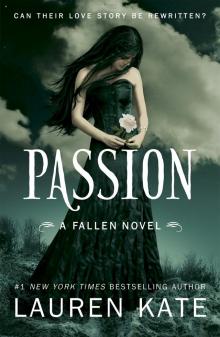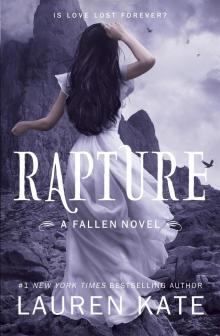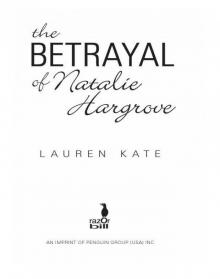- Home
- Lauren Kate
The Orphan's Song
The Orphan's Song Read online
YOUNG ADULT NOVELS
BY LAUREN KATE
TEARDROP SERIES
Waterfall
Teardrop
FALLEN SERIES
Unforgiven
Rapture
Fallen: Angels in the Dark
Fallen in Love
Passion
Torment
Fallen
The Betrayal of Natalie Hargrove
G. P. PUTNAM’S SONS
Publishers Since 1838
An imprint of Penguin Random House LLC
penguinrandomhouse.com
Copyright © 2019 by Lauren Kate
Penguin supports copyright. Copyright fuels creativity, encourages diverse voices, promotes free speech, and creates a vibrant culture. Thank you for buying an authorized edition of this book and for complying with copyright laws by not reproducing, scanning, or distributing any part of it in any form without permission. You are supporting writers and allowing Penguin to continue to publish books for every reader.
Ebook ISBN 9780735212596
This is a work of fiction. Names, characters, places, and incidents either are the product of the author’s imagination or are used fictitiously, and any resemblance to actual persons, living or dead, businesses, companies, events, or locales is entirely coincidental.
Version_1
For Milo,
always with me
CONTENTS
Young Adult Novels by Lauren Kate
Title Page
Copyright
Dedication
Prologue
Chapter One
Chapter Two
Chapter Three
Chapter Four
Chapter Five
Chapter Six
Chapter Seven
Chapter Eight
Chapter Nine
Chapter Ten
Chapter Eleven
Chapter Twelve
Chapter Thirteen
Chapter Fourteen
Chapter Fifteen
Chapter Sixteen
Chapter Seventeen
Chapter Eighteen
Chapter Nineteen
Chapter Twenty
Chapter Twenty-one
Chapter Twenty-two
Chapter Twenty-three
Chapter Twenty-four
Chapter Twenty-five
Chapter Twenty-six
Epilogue
Acknowledgments
VENICE
December 1725
IN A NORTHERN notch of the Adriatic Sea, beyond allegiance to Byzantium or Rome, a thousand-year-old empire was sinking. No one noticed her descent, disguised by centuries of wealth and reputation, like her citizens, living each day behind their carnevale masks.
See them in their gondolas, lovers lifting disguises beneath bridges to kiss. Imagine the senator, making his vote anonymously in the halls of the Doge’s Palace. And the little girl at the market buying artichokes with her mama, the black ribbon of her mask whipping in a summer wind.
In the years before the republic fell, this was the Venetian way: to make a mystery of everything, to obscure identity and life, never to look too closely at what lay underneath. For a thousand years, Venice had glittered at the center of the trading world, jewel of the Mediterranean. But when the trade routes shifted, and with them went the gold, she misheard her swan song as the music of celebration. She feasted more riotously than ever. Venice had always been sinking; why not don the masks another day and toast another pink sunset?
Except in the churches and the hospitals, where masks were forbidden. Most days, the city’s sick and the city’s orphans, those wards of the church, were the only bare faces in Venice.
This story begins in an orphanage, on a lonesome night in the sleepy neighborhood of Dorsoduro. There, in a nursery for foundling children, a five-year-old girl lay in bed, planning her escape.
* * *
WINTER HAD THE city in its grip again, and a driving wind rattled the pane of the window with its sad view of the building next door. Even if Violetta pressed against its glass, the most she could see was a curtained window through which no one ever looked out.
As soon as the others fell asleep, she would steal to the attic. Behind crates of old vestments and broken violins, its sole, high window cleared the neighboring rooftop. She could see how Venice stretched to the horizon. She could be alone.
She waited for the last whispers to fade to breathing, for the extraordinary stillness of three dozen sleeping girls. She had a trick for keeping patient: she explored the streets of Venice in her mind. She traveled up and down her city’s bridges, blinking at the trembling, gold reflection of the sun on the canal. If she focused, she could almost smell the water’s brine.
Four times had she been allowed beyond the orphanage walls, to walk the stone streets in a line of orphans taking alms, chanting, and invoking saints. Violetta held fast to those memories—gondoliers crooning, street performers throwing knives and swallowing fire, sidestepping white-masked noblemen and women, so unlike the barefaced orphans that they might have been another species. How she longed to wear a mask.
The walks always ended the same way: with the prioress turning the girls back to the Zattere, the sunny stone promenade slapped by the Giudecca Canal. Then they hurried past the traghetto stop, where gondoliers whistled beneath the brims of their straw hats. They passed the entrance to the building’s west wing, the sculpted head of a foundling boy marking the door of the male dormitory. They passed the central double doors—the public entrance, which opened to a high-ceilinged vestibule that led directly into the church. And then, too soon, they were back at the east wing, where the corresponding sculpted head of a foundling girl hung over the entrance of the only home Violetta had ever known.
In her imagination, this was the moment she broke free, took off running down the narrow calle, ducking past street hawkers until she found herself gloriously alone.
Until she wasn’t an orphan anymore.
In her mind, she was clattering across a stone bridge wearing the painted, wooden high-heeled clogs of a patrician lady. She was masked. She was boarding a gondola, wind dancing with her cloak. She was sailing for Giudecca, for a masquerade at one of the stately palazzi across the canal.
Or maybe she was going farther. Where?
How much more was there to this city, to life, than she had been allowed to see?
Beneath her covers, Violetta ran her thumb along her right heel, where the thin blue I branded her a ward of the Incurables. This mark told the universe that she had no family, that she belonged nowhere but here, within this walled, Istrian stone compound at the southern edge of the city.
The Incurables was built around a large square central courtyard with a towering church in its center. Outside San Marco’s Basilica, the cheisa degli Incurabili, church of the Incurables, was the most famous house of worship in Venice. Though it had earned its unsettling name in the sixteenth century from those dying of syphilis in the infirmary on the ground floor, more recently, the Incurables had become one of four hospitals renowned for a brighter function: training its foundling girls into a conservatory of musicians.
The two sexes were strangers within the Incurables. There were not only separate entrances for boys and girls, but separate worlds within: separate nurseries, dining rooms, and studies on either side of the compound’s second story. Found
ling boys grew up and moved on to apprenticeships; they needed no musical training. But to keep the girls off the streets, they were taught to sing and play for the church. Over time their performances deepened the church’s coffers, and this money paid the best composers to instruct the next generation’s most talented girls. The Incurables was made of music—the finest in the city and therefore in the world.
Violetta loved music. Her heart beat to the sacred concertos that echoed off the nursery walls, but she heard the silent mystery of her origins each day. She had been abandoned when she was two days old. No one knew where she had come from, who had brought her, or under what duress. From a young age she grasped that her caretakers—the priest and the prioress; the cook and the apothecary; even the benevolent zie, retired “aunts” who were themselves once foundlings—viewed her as a duty to be attended to.
The other girls sought affection from the zie, but Violetta couldn’t fake a bond. She needed food and warmth and shelter as much as any child, but she wanted love—real love, or no love at all. This longing infected her like a disease. She knew no cure.
* * *
FINALLY: A MEASURE of quiet in the nursery. Violetta’s practiced ear could tell, from the cadence of communal breathing, that the others were asleep at last. She rose from bed. Her bare feet made no sound on the cold mosaic tiles as she slipped out of the nursery, down the dark hall, and up the stairs.
She closed herself in the attic, rubbed her hands on her thighs for warmth, and checked her treasures on the windowsill: the sterling soldo dropped by the priest visiting from Rome; the peacock feather blown over the walls; the chipped porcelain honey bowl, discarded by the cook and long licked clean (though she dipped her finger in it every night, sucking the memory of sweetness). And, her most prized possession, Letta.
She had rescued the doll from the cold waters of the canal behind the orphanage. A few months back the orphans had been returning from an alms walk when Violetta saw a girl in a lace coat that sparkled with gold filigree arguing with her mother over a piece of candy. Seized by anger, the girl had simply let go of the doll. Before anyone noticed, Violetta plucked it from the water.
She called the doll Letta, short for Violetta—though Violetta had never been given a nickname. With the doll at her breast in the attic, she pressed against the window and felt the cold night beyond. Her breath frosted the pane as she stood on her toes to look out.
The water made the night look deeper, and a range of terra-cotta roofs, pitched at all angles, stretched farther than she could imagine. She wanted to reach out and touch the vines snaking through lattices on the balcony next door. She wanted to explore every narrow alley until she made it to the sea. Some nights she tried to count the black gondolas bobbing upon the canal. Other nights she stared at the water until her eyes teared.
The city was dark, unusually quiet. It was the start of Advent, two weeks when carnevale paused for Christmas, as if to let Venice catch its breath. There were no operas, no balls. Mass at the Incurables drew even larger crowds than normal, because the churches of the four ospedali became the only places in Venice to hear music. That night, the masked revelers—generally fixtures on the Zattere—were nowhere to be seen. The calli were empty. Almost.
“There he is,” Violetta gasped.
Down on the Zattere a man in a tricorne approached from the west. It was her favorite street performer coming up and over the bridge, now along the promenade. There was his small, spotted dog, whom Violetta had named Giacomo.
“Do you think he did well today?” she asked Letta.
What was it like to hustle in a huge piazza, your voice echoing off buildings, feeling the crowd draw near? Where did such a man go at night? Would he take Giacomo to one of the taverns Violetta had glimpsed longingly through closing doors on her walks?
“What would you order at a tavern, Letta? Brandy?” She wrinkled her nose, thinking of the vile little glass the prioress carried to bed. “I’d have acqaioli.”
She didn’t know what comprised the drink she’d overheard patrician ladies order on café steps, but she loved its opalescent sparkle and the way the women raised their masks just enough to tip it to their lips. She imagined acqaioli was rain from a sweetened cloud. Someday she would taste it.
When the man and his dog passed out of sight Violetta sighed.
“They’ll be back tomorrow,” she told Letta, even as she yearned to break through the window, to leap down and run after them, to touch Giacomo’s ears and feel his nose against her wrists. She had never touched a dog.
But then, a song—a woman’s voice—brought her attention to the calle below her window. Violetta leaned forward, scanning the darkness. She heard music all the time, but this was different. At the Incurables, they sang to commune with God. This music pulled her close not to God but to its singer.
Low in pitch and volume, the song sounded like a secret. It was not the ditty whistled by the street performer, not the gondolier’s cheeky barcarolle. This was love and sorrow stitched together so tightly Violetta could barely breathe.
When she found the woman in the moonlight, Violetta gasped. The singer was headed for the wheel.
To those walking past on the calle, the wheel looked discreet, a rusted metal half cylinder protruding from the base of the building’s western wall. But if you pulled the heavy iron handle to set the wheel in motion, you’d expose a wooden platform, no larger than the space made by Violetta’s embracing arms. On the other side, the wheel opened to the kitchen, where its contents would be discovered by the cook who came early to light the hearth.
Violetta knew the stories from before the wheel was built. Abandoned babies found frozen, blue at sunrise, outside the front gates. The wheel let mothers leave their children unexposed to rain and wind. You could keep your anonymity—and your child alive.
Violetta’s birthday was in early February. She knew she would be dead if not for the wheel. The contraption tormented her, but in all her nights spying from the attic, she’d never seen it turn. Now the singer approached it and dropped to her knees. She wore no mask, only a hooded cloak with a bulge beneath it. A baby.
Don’t, Violetta willed the woman. How could she not imagine her own mother at the wheel?
The woman opened her cloak, and Violetta was stunned to find her child was no baby. Relief flooded her. A boy that size would never fit inside. The woman would be forced to change her mind.
Her singing had intensified. Now Violetta could make out the words.
I am yours, you are mine . . .
Her fingers brushed fair hair from the boy’s closed eyes. They traced his shoulders, his elbows, down to his hands. Held them. A throb formed in Violetta’s chest, and she envied that boy for these caresses, even as she saw their end.
Tears shone on the woman’s cheeks. Her note wobbled, but she kept singing, turning her face before her sorrow dampened his skin. She looked up at the heavens, and Violetta saw her. She memorized this mother’s small straight nose, her round cheeks, her lips. She wore a large stone on a chain in the hollow of her throat. She was beautiful. Her features were washed in shame.
She heaved the wheel’s handle to the side, laid her boy on the wood circle, and bent his knees to his chest. She rubbed his feet softly, then desperately, as if no amount of effort could warm them to her satisfaction. Her son slept on.
Violetta held Letta to the window, frozen with dread, unable to look away as the woman turned the wheel. When it stuck, the mother’s palms pressed her son’s shoulders, and she forced him through with a violence that shocked Violetta to her core.
“This is what mothers do,” Violetta said. “This is what mothers are.” Her hands shook as she set her doll back on the windowsill, then looked up to meet her own eyes in the reflection of the glass. “Never be a mother.”
ONE
VIOLETTA!”
She spun from her bedroom window, from th
e seagull roosting on the terra-cotta rooftop next door. She’d been willing its wings to take flight and abandon this shadowy alley. If Violetta were a bird, she would be gliding over the ocean. She would never land on the same ship twice.
Outside, the September morning was so bright, and her sliver of sky so blue, that when she turned from the window it took a moment for her eyes to adjust to the heaving form in her doorway.
“What is it, Laura?” she asked, making room on the bed for her friend. Both girls were sixteen. They had been neighbors, sharing a wall between their single bedrooms on the second floor since they graduated from the nursery at ten. “Come, catch your breath. Take a lesson from a lazy seagull.”
But it wasn’t Laura’s nature to catch her breath. She could worry over anything, from rain dampening a feast day to what happened to sparrow eggs when a mother bird swallowed a pebble of glass. She worried over the moisture from her palms when she played a difficult piece on the violin, drying the wood fastidiously with linen so it wouldn’t warp. She worried over how to distinguish her playing from the other violinists in the music school. She worried deeply over being promoted to the coro, and she worried that Violetta didn’t worry enough about being promoted with her. She never missed an opportunity to remind Violetta that the coro had space for only thirty-three women at a time, less than half the number presently training in the music school. There were only a few openings each year, as the older girls married or retired to nunneries.
Laura worried over Violetta’s voice exercises and the sheet music for Violetta’s librettos—too often left scattered on the floor. Over the years, Laura had gotten better at making up excuses for the prioress when Violetta was late for a lesson, but she never stopped worrying that Violetta would be caned. Their relationship was a duet: the more Laura worried, the more Violetta gave her cause to.

 Fallen in Love
Fallen in Love Last Day of Love: A Teardrop Story
Last Day of Love: A Teardrop Story Teardrop
Teardrop Passion
Passion Fallen
Fallen Torment
Torment Waterfall
Waterfall Rapture
Rapture Unforgiven
Unforgiven The Betrayal of Natalie Hargrove
The Betrayal of Natalie Hargrove The Orphan's Song
The Orphan's Song The Fallen Sequence: An Omnibus Edition
The Fallen Sequence: An Omnibus Edition Teardrop (Teardrop Trilogy 1)
Teardrop (Teardrop Trilogy 1) Fallen_Angels in the Dark
Fallen_Angels in the Dark